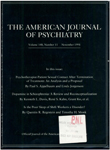Ability to form an alliance with the therapist: a possible marker of prognosis for patients with antisocial personality disorder
Abstract
Antisocial personality disorder is generally perceived to be refractory to treatment, particularly psychotherapy. In this study, the ability of 48 patients with this disorder to form a working relationship with a psychotherapist or drug counselor was examined in relation to outcome of 24 weeks of treatment evaluated at 7-month follow-up. Some antisocial patients were able to form working relationships with their therapists, and there was a significant association between the ability to form such a relationship and treatment outcome. Measures of this ability, such as the Helping Alliance Questionnaire, may help identify antisocial patients who can benefit from psychotherapy.
Access content
To read the fulltext, please use one of the options below to sign in or purchase access.- Personal login
- Institutional Login
- Sign in via OpenAthens
- Register for access
-
Please login/register if you wish to pair your device and check access availability.
Not a subscriber?
PsychiatryOnline subscription options offer access to the DSM-5 library, books, journals, CME, and patient resources. This all-in-one virtual library provides psychiatrists and mental health professionals with key resources for diagnosis, treatment, research, and professional development.
Need more help? PsychiatryOnline Customer Service may be reached by emailing [email protected] or by calling 800-368-5777 (in the U.S.) or 703-907-7322 (outside the U.S.).



